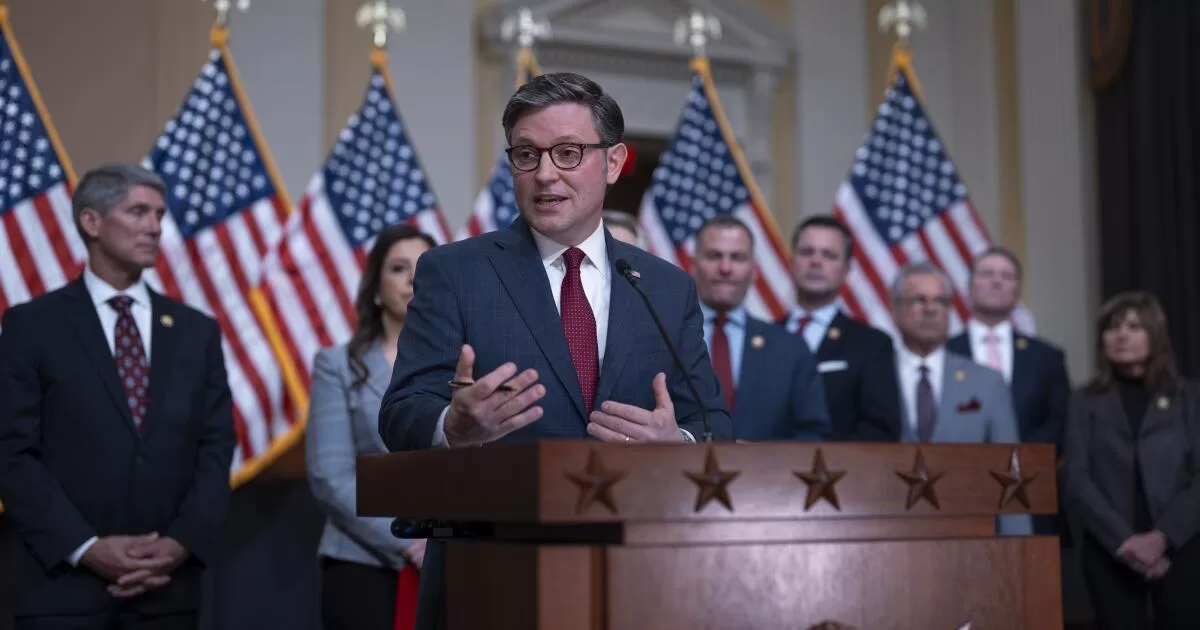Lawmakers are negotiating a second package of six bills, including defense, in an effort to have all federal agencies fully funded before a March 22 deadline. In the end, total discretionary spending set by Congress is expected to come in at about $1.66 trillion for the full year.
A significant number of House Republicans have lined up in opposition to the spending packages, forcing House Speaker Mike Johnson (R-La.) to use an expedited process to bring the bill up for a vote. That process requires two-thirds of the House to vote for the measure for it to pass.
The House passed the measure by a vote of 339-85.
The nondefense spending in this year’s bills is relatively flat compared with the previous year. Supporters say that keeping that spending below the rate of inflation is tantamount to a cut, forcing agencies to be more frugal and focus manpower on top priorities. Johnson cited a 10% cut to the Environmental Protection Agency, a 7% cut to the Bureau of Alcohol, Tobacco, Firearms and Explosives and a 6% cut to the FBI.
But many Republican lawmakers were seeking much steeper cuts and more policy victories. The House Freedom Caucus, which contains dozens of the GOP’s most conservative members, urged Republicans to vote against the first spending package and oppose the second one being negotiated.
“Despite giving Democrats higher spending levels, the omnibus text released so far punts on nearly every single Republican policy priority,” the group said.
Johnson countered that House Republicans have just a two-vote majority in the House while Democrats control the Senate and White House.
“We have to be realistic about what we’re able to achieve,” Johnson said.
Democrats staved off most of the policy riders that House Republicans sought to include in the package. For example, they beat back an effort to block new rules that expand access to the abortion pill mifepristone.
Democrats also said the bill would fully fund a nutrition program for low-income women, infants and children, providing about $7 billion for what is known as the WIC program. That’s a $1 billion increase from the previous year.
As part of those negotiations, House Republicans pushed to give a few states the ability to disallow the purchase of non-nutritious food, such as sugary drinks and snacks, in the food stamp program known as SNAP. The GOP’s effort was unsuccessful for now, but supporters say they’ll try again in next year’s spending bills.
“The bill certainly doesn’t have everything that we may have wanted, but I am very proud to say we successfully defeated the vast majority of the extreme cuts and hundreds of harmful policy riders proposed by the House Republicans,” said Rep. Rosa DeLauro, the top-ranking Democrat on the House Appropriations Committee.
House Republicans were able to achieve some policy wins, however. One provision, for example, will prevent the sale of oil in the Strategic Petroleum Reserve to China. Another policy mandate prohibits the Justice Department from investigating parents who exercise free speech at local school board meetings.
Another provision strengthens gun rights for certain veterans.
Under current law, the Department of Veterans Affairs must send a beneficiary’s name to the FBI’s National Instant Criminal Background Check System whenever a fiduciary is appointed to help manage someone’s benefits because they lack the mental capacity to manage their own affairs. This year’s spending package prohibits the department from transmitting that information unless a relevant judicial authority rules that the beneficiary is a danger to himself or herself, or others.
Rep. Mark Takano, the top Democrat on the House Veterans’ Affairs Committee, said a finding of mental incompetency by the VA is typically based on “very serious mental health conditions like schizophrenia and dementia.”
“They wanted so badly to make sure that vulnerable veterans could access more firearms,” Takano said. “This is wrong. Lives are on the line. Veterans’ lives are on the line, and I will not agree to legislation that will cause more people’s lives to be lost to gun violence.”
Republicans have argued that current VA policy deters some veterans from seeking the care and benefits they have earned.
In a closed-door meeting with the House GOP, Johnson, looking to show that Republicans did get some policy wins in the negotiations, read from a news report about how Democrats were having “heartburn” about the gun provision, according to a Republican familiar with the discussion who was not authorized to discuss it publicly.
The bills to fund federal agencies are more than five months past due with the budget year beginning Oct. 1. House Republicans are describing an improved process nevertheless, saying they have broken the cycle of passing all the spending bills in one massive package that lawmakers have little time to study before being asked to vote on it or risk a government shutdown.
But critics of the bill, such as Rep. Scott Perry (R-Pa.), were dismissive about how much the process really changed.
The first package covers the departments of Veterans Affairs, Agriculture, Interior and Transportation, among others.
Democrats overwhelmingly supported the bill, with 207 voting for it and two voting against. The vote among Republicans was 132-83.
“Once again, Democrats protected the American people and delivered the overwhelming majority of votes necessary to get things done,” House Democratic leader Hakeem Jeffries said.
Rep. Kevin Hern (R-Okla.) said he opposed the bill because “I’ve not made any bones about it since I’ve been here. We have to get spending under control and we’ve lost the leverage.”
AP Congressional Correspondent Lisa Mascaro contributed to this report.
